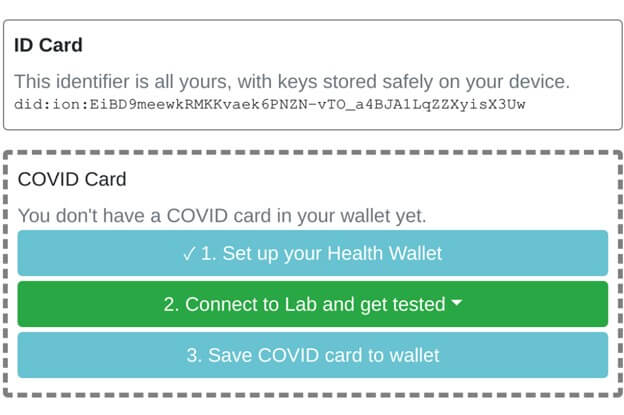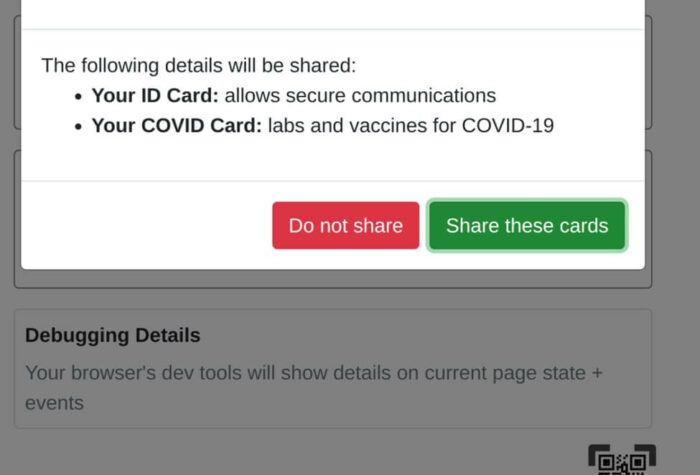
The News: The Vaccination Credential Initiative that was announced in January has launched, and Oracle, Microsoft, Salesforce, the Commons Project, and a collection of heavy hitters in the healthcare space have partnered in a coalition called the Vaccination Credential Initiative (VCI) in order to facilitate the ability for vaccinated individuals to have what is being referred to as a ‘vaccination passport.’ This vaccination passport will allow individuals who have been vaccinated against COVID-19 to easily access their vaccination records in a secure and verifiable manner, while also preserving privacy and will likely look similar to what you see in the header image above, which is the Common Pass developed by the Commons Project Foundation. See the press release here.
The Vaccination Credential Initiative: Oracle, Microsoft, Salesforce and Healthcare Majors Partner to Develop Vaccination Passport
Analyst Take: The creation of the Vaccination Credential Initiative was announced earlier this week, with a goal of empowering individuals who have received the COVID-19 vaccination to be able to quickly and securely access their vaccination information in an easily verifiable manner. Coalition partners in the VCI include Oracle, Microsoft, Salesforce, the Mayo Clinic, CARIN Alliance, Cerner, Change Healthcare, The Commons Project Foundation, Epic, Evernorth, MITRE, and Safe Health.
Managing Vaccination Records is a Headache: The VCI Aims to Fix That
As a frequent traveler, as well as a parent charged with managing the vaccination schedule of other humans, this is exciting news. Managing vaccination records is, in my experience, a largely manual, wholly inefficient process.
You get a vaccination, there’s a record, somewhere, usually at your physician’s office, and if you ever need it, it’s a phone call or a visit to the healthcare portal (where of course you can’t remember your login information) or some other not at all efficient method of trying to get your hands on information that really should be at your fingertips at all times.
That’s why news of the Vaccination Credential Initiative is so relevant, especially now, with a massive vaccination effort underway here in the US (and in other countries around the world). The overarching goal of the VCI is to provide a common registry of issuers, along with SMART Health Cards, building a nationwide system that more readily enables verifiable vaccination records to be accessed, controlled, and shared, which is an important part of our collective ability to return some semblance of normalcy — returning to the workplace, attending events, traveling internationally, sending young people to school and more.
This credentialing will enable individuals who have been vaccinated for COVID-19 to quickly digitally access their immunization records in an easily accessible, secure, verifiable and privacy-preserving manner. These credentials can, of course be accessed and used to provide proof of vaccination when needed for purposes of work, events, travel, schools, and any other relevant entities.
How the Vaccine Credential Will Work
How will it work? VCI coalition members are working to enable digital access to vaccination records using the open, interoperable SMART Health Cards specification, which is based on W3C Verifiable Credential and HL7 FHIR standards. Their goal is to allow individuals to access vaccination records by way of an encrypted digital copy that can be stored in a digital wallet. People without smartphones can access their records and print a QR code that will contain W3C verifiable credentials.
One of the challenges the coalition is addressing is to ensure that underserved populations have access to this verification, providing convenient access to all across the digital divide. No small undertaking, but an important one.
Here’s an example of a SMART Health Card:

And then another example of what the sharing options (including a QR code) look like:

Image credits: HealthWallet.cards
Strategic Global Partnerships Are a Key Part of Fighting COVID-19
Each of these coalition members brings its own strengths to the VCI initiative, and it’s yet another example of the strategic partnerships that are collectively helping the citizens of the world navigate a global pandemic. This is the most massive, most significant vaccination effort in the history of the U.S., and something that the majority of us have never thought about or experienced beyond the effort required to obtain the vaccinations necessary to send our kids to school.
The bad news? The US is behind the curve when it comes to the technology that powers easy, verifiable, encrypted healthcare data sharing. The good news, the COVID-19 pandemic is forcing us to remedy that. The VCI Coalition and its savvy partners are clearly moving mountains to help get us collectively where we need to be. For that, I am very grateful. And I look forward to seeing what’s ahead with this initiative.
Futurum Research provides industry research and analysis. These columns are for educational purposes only and should not be considered in any way investment advice.
Other insights from the Futurum team:
The original version of this article was first published on Futurum Research.
Sarah brings 24 years of experience as an industry analyst to the Futurum team. She most recently served as the head of industry research for Oracle. Her experience working as a research director and analyst extends across multiple focus areas including AI, big data and analytics, cloud infrastructure and operations, OSS/BSS, customer experience, IoT, SDN/NFV, mobile enterprise, cable/MSO issues, and managed services. Sarah has also conducted primary research of the retail, banking, financial services, healthcare, higher ed, manufacturing, and insurance industries and her research has been cited by media such as Forbes, U.S. News & World Report, VentureBeat, ReCode, and various trade publications, such as eMarketer and The Financial Brand.

